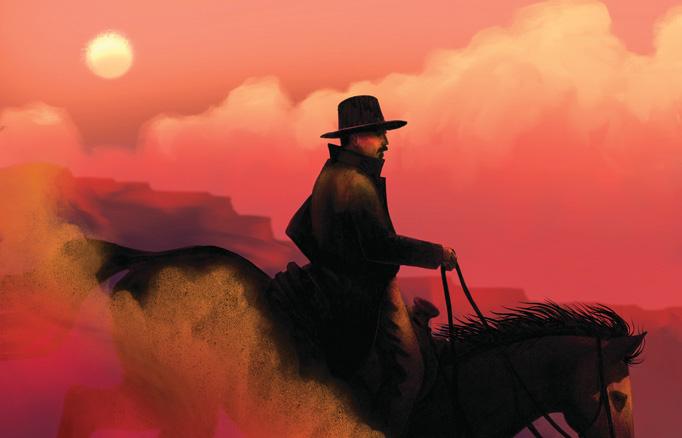
Westerns are an inherently political genre, for the obvious reason that they depict (or distort or interrogate) American history. But they are also political in that they show the birth of the polis itself—the institutions of modern urban society, with their laborers, clerks, merchants, teachers, sheriffs, entertainers. Where philosophers from Plato to Rousseau sought to imagine the development of civil society from first principles, the makers of Westerns—John Ford, Howard Hawks, Raoul Walsh—showed it being created from the ground up, by hands-on labor.
Unlike the blank pages awaiting philosophers’ fancies, the American West was already inhabited, and the Indigenous peoples living there had well-developed social orders, so Westerns are, unavoidably, tales of conquest and subjection. Westerns, which emerged around the dawn of the twentieth century—while the westward expansion that they depicted was still going on—have often served to whitewash a bloody past and ease the mainstream conscience. If the genre has a particular bent toward mythology, it’s because this episode of American history admits of no honest telling without shame and dishonor. The Western, at its worst, is a series of convenient lies, but the genre also encompasses works that look frankly at prejudice and at crimes against humanity. In John Ford’s “The Searchers” (1956), an Indian-hating warrior goes into self-imposed exile; Robert Aldrich’s “Apache” (1954) dramatizes the heroic struggle for freedom of Geronimo’s subchief, Massai.
この記事は The New Yorker の July 08, 2024 版に掲載されています。
7 日間の Magzter GOLD 無料トライアルを開始して、何千もの厳選されたプレミアム ストーリー、9,000 以上の雑誌や新聞にアクセスしてください。
すでに購読者です ? サインイン
この記事は The New Yorker の July 08, 2024 版に掲載されています。
7 日間の Magzter GOLD 無料トライアルを開始して、何千もの厳選されたプレミアム ストーリー、9,000 以上の雑誌や新聞にアクセスしてください。
すでに購読者です? サインイン

ART OF STONE
\"The Brutalist.\"

MOMMA MIA
Audra McDonald triumphs in \"Gypsy\" on Broadway.

INTERNATIONAL AFFAIRS
\"Black Doves,\" on Netflix.

NATURE STUDIES
Kyle Abraham's “Dear Lord, Make Me Beautiful.”

WHAT GOOD IS MORALITY?
Ask not just where it came from but what it does for us

THE SPOTIFY SYNDROME
What is the world's largest music-streaming platform really costing us?

THE LEPER - LEE CHANGDONG
. . . to survive, to hang on, waiting for the new world to dawn, what can you do but become a leper nobody in the world would deign to touch? - From \"Windy Evening,\" by Kim Seong-dong.

YOU WON'T GET FREE OF IT
Alice Munro's partner sexually abused her daughter. The harm ran through the work and the family.

TALK SENSE
How much sway does our language have over our thinking?

TO THE DETECTIVE INVESTIGATING MY MURDER
Dear Detective, I'm not dead, but a lot of people can't stand me. What I mean is that breathing is not an activity they want me to keep doing. What I mean is, they want to knock me off. My days are numbered.